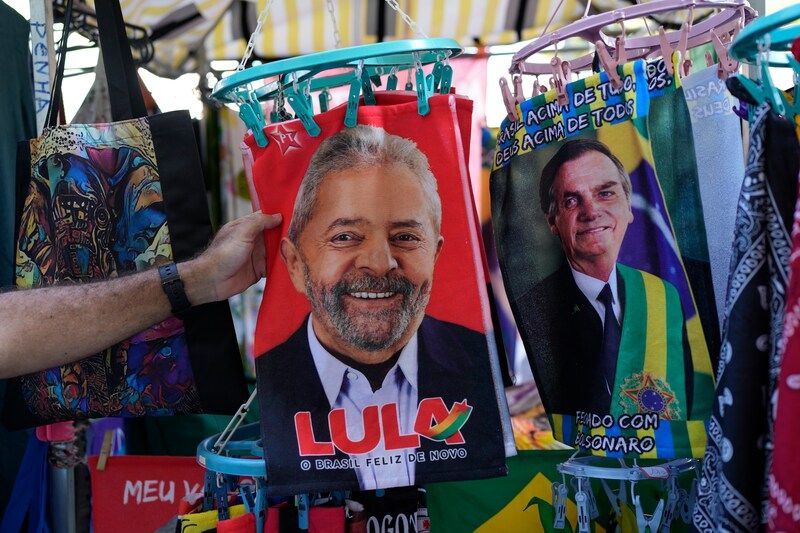
Brazil’s presidential elections this October will be the most consequential since the return of democracy in 1985 — a pivotal contest between a revanchist left and a toxic right.
Or so many will have you believe.
The fact is that Brazil’s dysfunctional politics won’t be fixed by whoever occupies the Palácio do Planalto, the presidential palace in Brasilia.
The election pits the most unashamedly boorish leader in decades, right-wing incumbent President Jair Bolsonaro, against the left’s most enduring brand, former president Luiz Inácio Lula da Silva. Polls say that the election is Lula’s to lose. Still, his boosters and a fair number of pundits foretell an increasingly nasty election — “one of the most violent and mendacious campaigns in history”, newspaper O Estado de Sao Paulo warned — in which nothing less than Brazilian civility, law and order, and democracy itself are on the line.
Yet the heart of Brazil’s political mess lies in the “Centrão”, or the Big Middle, an amalgam of political parties with no discernible principles or loyalties, only ambitions and appetites. Whoever takes office on Jan. 1 faces a familiar Faustian bargain: cut a deal with a fractious legislature dominated by this alliance of opportunists, or go it alone and risk scuttling governability and perhaps the presidential mandate itself.
In a field fractured among 32 registered parties, Brazil’s next president will take office with diminished political capital. Splintered democracy is the norm in Latin America, but Brazil’s electoral system borders on incoherence. With taxpayer-funded campaign finance and guaranteed free television time for each new party, the system is rigged for self-replication. From 1988 to 2018, Brazil’s famously prolific roll of effective parties — a composite index of both votes and congressional seats — multiplied fourfold, from four to 16. New rules establishing a vote threshold for microparties promise to winnow the field, but change will come slowly. So much the better for the Big Middle, whose fortunes soar as presidents flail.
“The Centrão’s strength emerges from the hyper-fragmented party system”, political analyst Octavio Amorim Neto, of the Getúlio Vargas Foundation, told me. “That’s bad for whoever is in power. The Centrão’s abiding interest is weakening the president to obtain benefits”.
The Centrão helped engineer the impeachment of Fernando Collor de Mello in 1992 and Dilma Rousseff in 2016. Both presidents had snubbed them. The Centrão also survived two seismic corruption scandals — a congressional kickback scheme in 2004-2005, and the landmark Car Wash pay-to-play investigation of 2014-2021 — only to see the moralizing prosecutors demoralized. Tellingly, while former presiding Car Wash magistrate Sérgio Moro fell into disrepute for judicial overreach, some of the Centrão’s headline convicts have seen their cases overturned and records scrubbed.
Bolsonaro, channeling Donald Trump, regularly attacks the integrity of Brazil’s electoral system and surrounds himself with military men. Such theatrics have fueled fears that Brazil’s tender democracy is in peril. But Bolsonaro’s script is the cant of weakness, not strength. With little apparent interest in governing and trailing Lula by double figures in most polls, Bolsonaro increasingly has left the levers of power and plum patronage jobs to the go-to operators of the Centrão. They have made an art of holding presidents to ransom.
In 2019, Centrão lawmaker Ricardo Barros helped launch a congressional investigation into Bolsonaro’s alleged role in spreading fake news, only to be named as the government congressional leader later that year. Unsurprisingly, the probe eventually fizzled. “The Centrão’s logic is one of political extortion”, said Federal University of Santa Catarina political scientist Luciano Da Ros, co-author with American University scholar Matthew M. Taylor of “Brazilian Politics on Trial: Corruption & Reform Under Democracy”.
Holding the budget hostage is another Centrão specialty. In most nations, public money is bound by fixed spending mandates, say for pensions and salaries, leaving the executive branch to designate the lion’s share of what remains as discretionary funds. The U.S. Congress spends just 2.3 percent of total discretionary funds on pork barrel projects. In Brazil, under opaque rules penned by the Centrão, lawmakers control proportionately five times that amount (11.6 percent) of pork, according to a study by Marcos Mendes, an economist at Insper business school. Indeed, the Brazilian congress’s share of discretionary spending surpasses that of 29 of the wealthiest nations in the Organization for Economic Cooperation and Development, Mendes found.
Bolsonaro has proven especially vulnerable to the Centrão. But what about Lula? Silly question. During his first administration, he helped empower them and could not have governed without them. “The Centrão is malleable. They’re at home in any government, right or left”, said Da Ros.
Talk of an impending coup misses the point. Latin America’s biggest constitutional democracy is indeed in deep trouble — but not from authoritarianism. The real problem is the menace in the middle.
Mac Margolis, an adviser to the Brazilian Igarapé Institute, writes frequently about Latin America. He is the author of “The Last New World: The Conquest of the Amazon Frontier”.
